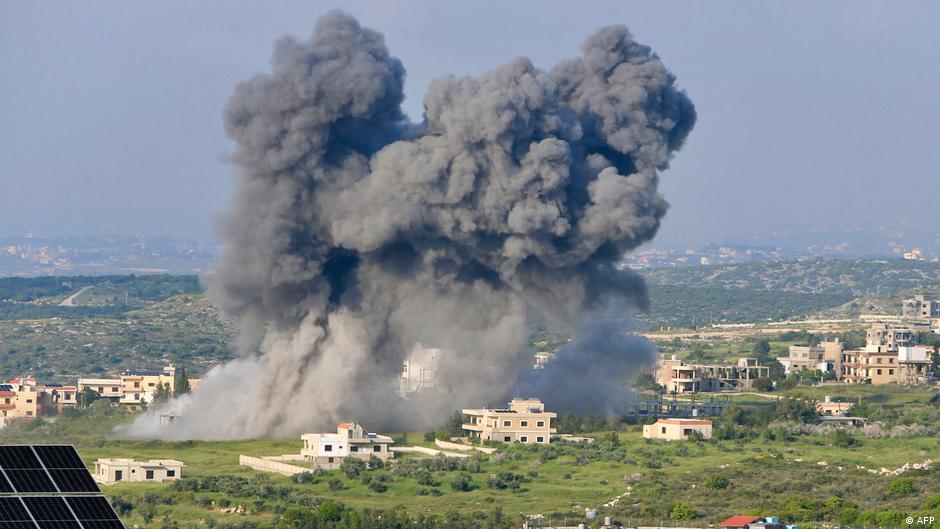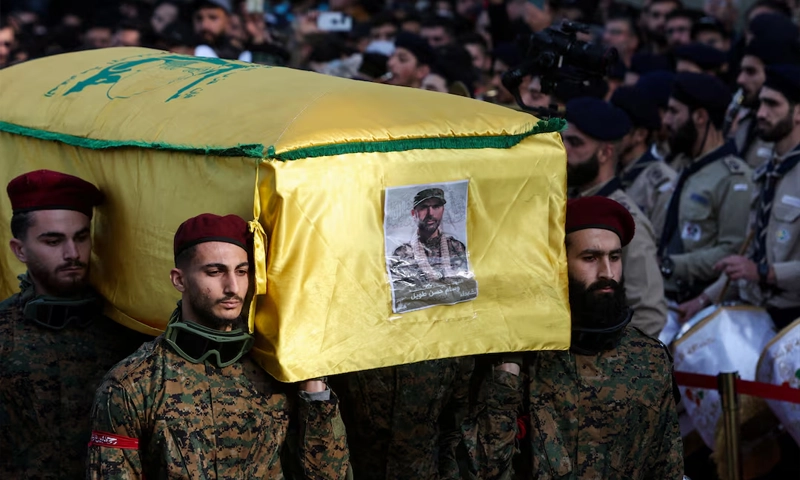- Reuters
- 3 Hours ago

Lebanon: Fears rise over a potential war with Israel
-
- DW
- Jun 14, 2024

BEIRUT: Around 150,000 people have been displaced from areas around the Lebanon-Israel border. As fighting between Hezbollah and the Israeli military ramps up, Lebanese locals are dealing with difficult choices.
When the most recent round of fighting between Israel and the Lebanon-based militant group, Hezbollah, began, Lebanese woman Malak Daher hoped it would only last a few days.
Read more: 9 Israeli military sites with rockets, drones: Hezbollah
“It’s so hard to be so far from your life,” said the 30-year-old, who was displaced from the southern town of Mais al-Jabal, located almost directly at the Lebanese-Israeli border where fighting is centered. “You feel like your life is on hold. Like, life is going on elsewhere, but your own time has stopped.”
But the fighting between the Lebanese militant group, Hezbollah, and the Israeli military did not end. In fact, over the past few weeks, it seems to have ramped up.
Daher survived the 2006 war in southern Lebanon between Israel and Hezbollah, but said that felt like nothing compared to the current exchange of blows.
In early June, human rights groups reported that Israel fired white phosphorous munitions over Lebanese towns, in violation of international humanitarian law. This week, Hezbollah has fired more than 160 rockets into Israel, in retaliation for Israel’s assassination of two of their commanders.
Ever since the October 7, 2023, attack on southern Israel by Hamas, the situation on the Israel-Lebanon border has been tense.
Hezbollah, a powerful Lebanese group that plays a dominant part in Lebanese political and social life, considers Hamas an ally and the state of Israel an enemy.
After two inconclusive wars in 1996 and 2006, Israeli forces and Hezbollah have preferred tit-for-tat attacks in each others’ territories, without huge casualty counts.
Fears of full-scale war in Lebanon
However, since October 7, these sorts of attacks have expanded from both sides, both in size and range.
This has raised concerns that unrest at the border will turn into a full-scale war. Because of this, concerns are growing that unrest at the border will turn into a full-scale war. Several extremist Israeli politicians have said that Israel should attack Hezbollah now. A survey this month also indicated that a majority of Israeli citizens think starting a war with Hezbollah is a good idea.
“The October 7 attacks dramatically increased Israeli insecurity,” a March briefing by the Washington-based think tank, the Center for Strategic and International Studies, explained. “If Hamas, less well-armed and trained than Hezbollah, can brutally kill over 1,100 Israelis, what might the more formidable Hezbollah do?”
It is unclear whether a wider war will break out. Current international diplomatic efforts are dedicated to preventing this, and most experts argue it would be strategically unwise for Israel to open another front as it continues its military operations in Gaza. They also point out that Hezbollah is a far better armed and more powerful adversary than Hamas in Gaza.
As for Lebanon, the country has been mired in economic and political crises for years now. Even if the population sympathizes with Palestinians, more than 37,000 of whom have been killed in Gaza in the past eight months, Lebanese locals — struggling with inflation, unemployment and political uncertainty — are unlikely to support Hezbollah dragging them towards war.
Lebanese authorities say there have been more than 375 fatalities in Lebanon since October 2023, including 88 civilians, due to Israeli strikes. Israel’s military has counted 18 soldiers and 10 civilians killed by Hezbollah fire.
Tens of thousands internally displaced
Tens of thousands of civilians — around 100,000 Lebanese and more than 60,000 Israeli — living on both sides of the border have also been displaced by fighting.
Locals told DW that those who left southern Lebanon were reluctant to return unless they absolutely need to. Some went back to check on property whenever things seemed calmer, or to attend a funeral, for example. But most shops and supermarkets in the area were closed, and it was hard to find supplies, they said.
When Daher first fled to Beirut after border skirmishes began in late 2023, the trained nurse was unemployed. So, she said she decided to go back to work at a hospital in southeastern Bint Jbeil, also near Lebanon’s border with Israel. Now, she stays there for three days, works her shifts, then returns to Beirut, where she and her mother are staying with relatives.
At one point, Daher so desperately wanted to return to Mais al-Jabal that she and her 60-year-old mother, who used to make a living growing olives and tobacco in the border village, journeyed back. But it was a nightmare, Daher told DW. They couldn’t sleep because of missiles and rockets coming in all night long and simply hid in the corridor.
“I thought we were going to die together,” recounted Daher, whose husband works in Kuwait. As soon as the sun came up, the pair returned to Beirut. Now Daher only comes back to work, even though she is well aware of how dangerous it is. In late May, an Israeli strike nearly hit the hospital where she works.
“They haven’t just taken my time,” Daher said of the Israeli military. “They’ve stolen my ambitions and my peace. I have become an angry, anxious woman who waits for aid. Before this, I was an independent woman.”
Some people in Lebanon refuse to leave home
A handful of people in southern Lebanon have refused to leave, despite the ongoing fighting and growing threat of war. One of them is Issam Alawieh, 44 and a father of seven. He has stayed in his home in the border village of Maroun el-Ras along with his wife and two of his sons. The family has survived three Israeli air strikes so far.
“You hear only the crash. It’s like a volcano coming from beneath you,” said Alawieh, who lost his hearing for a week after one attack.
Alawieh has continued working in a bakery in nearby Bint Jbeil.
“Even though the income is not good and sales have decreased [by] 95%, I have to continue to provide food for my children,” he told DW.
Living in such dangerous conditions was better than being displaced and forced to accept aid elsewhere, Alawieh argued. Neighbours who fled town called him crazy, he said, but he believes his family has adapted. The children were getting used to the sound of bombing.
Read more: Israeli strike reported to have killed two people in southern Lebanon
“If I go and leave everything here, I will be humiliated, and I don’t want that,” he explained. But there’s more to it than that, he added: This is his home.
“I cannot live away from south Lebanon. This land is like my mother,” he argued. “I cannot survive without her, and we will win as long as we are steadfast in our land.”






